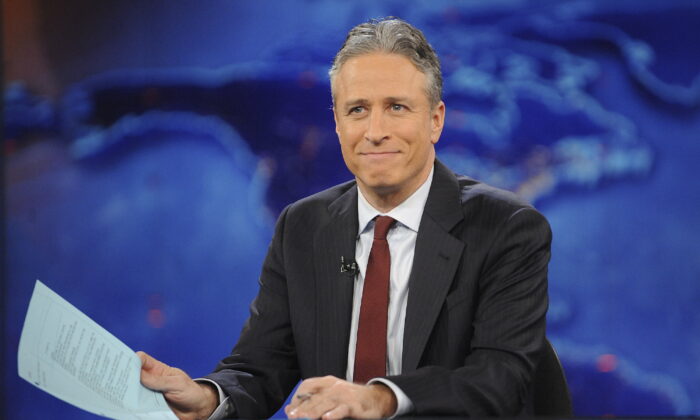Peter Menzies highlights how Carney’s interview with the American ‘Daily Show’ highlights the failure of promoting Canadian content.
Commentary
During these tumultuous times, a clear sign has emerged indicating that a significant portion of English Canada shares similarities with America when it comes to culture.
The focal point of this observation is the decision made by Mark Carney, the potential leader of Canada’s Liberal Party and future prime minister, to kick off his campaign by appearing on Jon Stewart’s “The Daily Show” on Comedy Central, an American cable channel.
Typically, it is rare, if not unprecedented, for a politician to seek popularity in their own country by appearing on a foreign television program as the starting point of their campaign. It’s possible that other prominent candidates may follow suit with a similar strategy.
This decision also reflects poorly on the CBC—both in English and French. Mr. Carney’s campaign likely chose “The Daily Show” for his preview because it was expected to garner the right kind of attention in Canada. Additionally, it allowed for a non-hostile interview from which valuable social media clips could be extracted. Alternatively, he could be emulating the approach taken by outgoing Prime Minister Justin Trudeau, who has exclusively given interviews to American media since announcing his resignation.
One could argue that, despite previous efforts, there are no Canadian late-night talk show alternatives on TV networks. However, Mr. Carney could have easily offered himself to CBC News Network, CTV News Channel, or even CPAC. Speculations arise that he opted not to do so due to the higher political risk associated with dealing with journalists as opposed to comedians. It’s also likely that an interview with Jon Stewart holds more social prestige in Canada than a sit-down with Canadian journalists like Rosemary Barton or Vassy Kapelos.
From this situation, one noticeable implication is that Mr. Carney’s choice is detrimental to the CBC, which finds itself in a vulnerable position. The network is currently a target for potential defunding under a Conservative government. Its television ratings, especially in English, are subpar, and its anticipated rejuvenation through a new mandate has been overshadowed by Minister Pascale St-Onge’s parental leave and Mr. Trudeau’s impending resignation once a new Liberal leader is selected on March 9.
Now, the apparent message from the man poised to be the country’s next prime minister is that the CBC, established to showcase Canada through Canadian perspectives rather than American, is, if not irrelevant, definitely secondary.
The entire Canadian broadcasting system, regulated by the CRTC like the CBC, was initially designed to safeguard the nation’s cultural identity and shield it from being engulfed by American content. Despite persistent efforts, Mr. Carney’s preference for “The Daily Show” serves as another indication that these initiatives have fallen short.
Canadian audiences, akin to Mr. Carney, have a preference for American content. They consume it during prime time and online. When a popular U.S. program shifts from a Tuesday slot to a Thursday slot, the Canadian network holding rights to that program follows suit. Essentially, the nation’s television schedules are dictated south of the border, with the exception of the CBC, which airs Canadian shows in prime time that struggle to attract large viewership.
In terms of news consumption, American channels like CNN and MSNBC are often as or more popular in Canada than CBC News Network or CTV News Channel. It’s not surprising to hear Canadians reference American legal terms and phrases derived from the U.S. Constitution. Television plays a significant role in shaping culture, and in Canada, American content continues to dominate despite enduring efforts by the CBC and CRTC since the licensure of cable networks to deliver American programming north of the border.
This trend will likely persist in the future, notably after the upcoming events starting with Donald Trump’s presidential inauguration on Jan. 20, followed by a potential trade war with Canada. Mr. Trump’s administration may initiate tariffs and other economic measures targeting Canada to pressure for its annexation. During these developments, it will be interesting to observe which TV news sources Canadians gravitate towards.
Regarding the political ramifications of Mr. Carney’s “The Daily Show” appearance, his opponents need not worry excessively. The majority of Canadians were likely more focused on watching the Rams defeat the Vikings on NFL Monday Night Football, rather than being invested in the outcome of Canada’s future Liberal leader, or rather, prime minister.
Views expressed in this article are opinions of the author and do not necessarily reflect the views of The Epoch Times.





